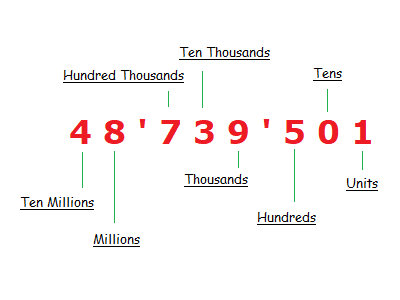The most common types of numbers we encounter almost everyday are whole numbers.
Numbers such as the following. 4 , 27 , 118
But what number place value does each digit a number have?
Number Place Value
Each individual digit in a whole number has a specific place value.The largest digits are to the left side, moving along to the smallest on the right side.

When dealing with larger numbers in the thousands or greater.
It is often good practice to place a comma or apostrophe after every 3 numbers, as it can make a large number appear neater and easier to read.
48’739’501 or 48,739,501
Examples
1.1
6’243 The digit 2 is hundreds.
6’243 The digit 2 is hundreds.
1.2
85’320 The digit 2 is tens.
85’320 The digit 2 is tens.
523’481 The digit 2 is tens of thousands.
Rounding Whole Numbers
When it comes to rounding a whole number, what we’re doing is making it a little bit simpler, but still keeping the overall value close to the original number.
We could round the numbers 524 and 526 to the nearest ten.
524 would be rounded down to 520
526 would be rounded up to 530
When to round up or down
Whether a number is rounded up or down, is dependent on the value of the next digit that’s after the place being rounded to.81, 82, 83, 84 can be rounded down to 80.
85, 86, 87, 88, 89 can be rounded up to 90.
If the next digit 4 or less, we round down. If the next digit is 5 or more, we round up.
The digits after the rounded place become 0, simplifying the overall number.
As we aren’t concerned what happens after the rounded to place.
Whole numbers can be rounded to the nearest ten, nearest hundred, nearest thousand, etc.
Examples
2.1 TENS
a) 53 rounded to the nearest 10 is 50.
b) 246 rounded to the nearest 10 is 250.
c) 52’813 rounded to the nearest 10 is 52’810.
2.2 HUNDREDS
a) 261 rounded to the nearest hundred is 300 ( 6 after 2, round up )
b) 7’342 rounded to the nearest hundred is 7’300. ( 4 after 3, round down )
2.3 THOUSANDS AND MILLIONS
a) 7’341’249 to the nearest thousand is 7’341’000. ( 2 after 1, round down )
b) 7’841’249 to the nearest million is 8’000’000. ( 8 after 7, round up )
Whole numbers can also have negative values as well as positive, more information can be seen on the positive and negative numbers page.
- Home ›
- Arithmetic/Numbers › Number Place Value